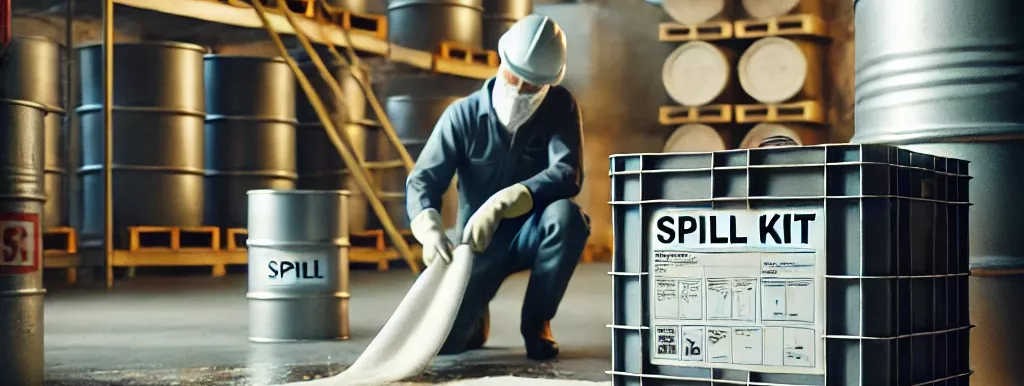
Introduction
Imagine this: you're running a busy workplace when suddenly, a chemical spill occurs. Panic sets in. What do you do? Unfortunately, for many businesses, the answer isn't clear. This scenario highlights the importance of having a spill response plan in place. Whether it's oil, fuel, chemicals, or other hazardous substances, being prepared can save your business time, money, and even lives.
At SERPRO Ltd, we specialise in helping businesses like yours develop and implement effective spill control strategies. In this blog, we'll explore why a spill response plan is essential and how the right preparation can safeguard your operations, employees, and the environment.
The Risks of Being Unprepared
Spills, whether large or small, can have far-reaching consequences for businesses. Here are some key risks of not having a spill response plan:
- Environmental Damage: Leaks or spills of hazardous materials can contaminate soil and water, leading to legal penalties and damage to your company’s reputation.
- Financial Losses: Cleaning up a spill without proper tools or training can be costly. Fines for non-compliance with environmental regulations can add to the burden.
- Health and Safety Hazards: Employees exposed to hazardous materials during an unplanned spill response may suffer injuries or illness.
- Operational Downtime: Delays caused by unpreparedness can disrupt workflow, leading to lost productivity.
Key Components of a Spill Response Plan
An effective spill response plan ensures that your business can act swiftly and safely. Here’s what it should include:
1. Risk Assessment
Begin by identifying the types of spills your business might encounter. Consider:
- The nature of materials stored on-site (oil, chemicals, fuel, etc.).
- Potential spill scenarios (equipment failure, human error, accidents).
- The areas most at risk (storage rooms, loading bays, or production lines).
2. Spill Response Equipment
The right tools are essential for effective spill management. SERPRO Ltd offers a wide range of solutions, including:
- Spill Kits: Pre-packaged kits designed for oil, chemical, or general-purpose spills.
- Absorbents: Pads, rolls, and socks for containing and cleaning up fluids quickly.
- Drip Trays and Storage Bunds: Prevent spills by safely storing liquids.
- Chemical Neutralisers: Essential for neutralising hazardous substances.
3. Training Employees
Even the best equipment is useless without trained personnel. Your spill response plan should include:
- Regular Training: Teach employees how to use spill kits and follow response protocols.
- Drills and Simulations: Conduct practice scenarios to ensure everyone knows their role during a spill event.
- Emergency Contact Lists: Provide a list of internal and external contacts, including environmental agencies and cleanup specialists.
4. Step-by-Step Response Strategy
Establish a clear process for managing spills. Here’s an example:
- Assess the Situation: Identify the type and size of the spill.
- Alert Personnel: Notify employees and evacuate the area if necessary.
- Contain the Spill: Use absorbents, spill socks, or barriers to prevent further spread.
- Clean Up Safely: Follow guidelines for using spill kits and disposing of waste correctly.
- Report and Review: Document the incident and update your response plan if needed.
The Role of Compliance in Spill Preparedness
Environmental regulations require businesses to have measures in place for preventing and managing spills. In the UK, for instance, businesses must comply with:
- Environmental Protection Act 1990: Governs the handling and disposal of hazardous waste.
- Control of Substances Hazardous to Health (COSHH): Ensures safe management of hazardous materials.
Failing to comply can result in hefty fines and legal action. SERPRO Ltd can help your business stay compliant by supplying industry-leading spill control products and advice.
How SERPRO Ltd Can Help
At SERPRO Ltd, we understand the challenges businesses face when dealing with spills. We provide:
- Customised Solutions: Spill kits and absorbents tailored to your needs.
- Expert Advice: Guidance on creating and implementing spill response plans.
- Ongoing Support: Training resources and product replenishment to keep you prepared.
Our products, from chemical absorbents to bunded storage systems, are designed to meet both small-scale and industrial needs. With SERPRO Ltd, you can trust that your business is ready for any spill scenario.
Benefits of Having a Spill Response Plan
A well-designed plan offers numerous benefits:
- Quick Response Times: Minimise damage and downtime by acting swiftly.
- Employee Safety: Reduce the risk of injuries during spill events.
- Cost Savings: Avoid fines, legal fees, and expensive cleanup operations.
- Reputation Management: Demonstrate your commitment to environmental responsibility.
- Regulatory Compliance: Meet all legal requirements with confidence.
Real-World Examples
Case Study: A Manufacturing Facility
A manufacturing company in the Midlands faced a significant oil spill due to a faulty storage drum. Without a spill response plan, the incident caused operational delays and environmental fines. After consulting SERPRO Ltd, the company implemented a tailored plan with spill kits and employee training. They’ve since avoided similar incidents, saving time and money.
Final Thoughts
Every business, regardless of size or industry, can benefit from a spill response plan. Preparation not only protects your employees and the environment but also ensures your business remains operational and compliant. Don’t wait until disaster strikes—be proactive and invest in spill response solutions today.
SERPRO Ltd is here to help you every step of the way. Explore our range of spill kits, absorbents, and storage solutions to get started.
